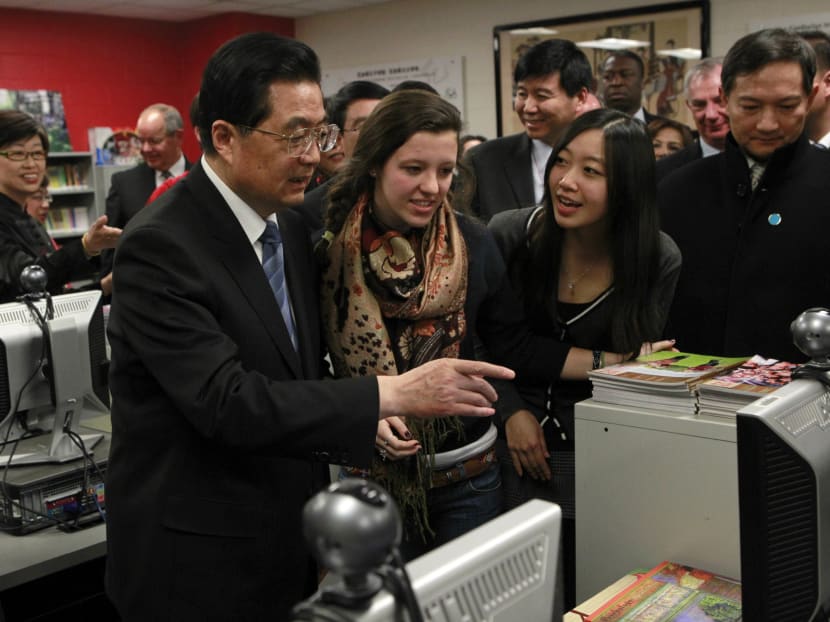Toronto schools reject Confucius deal, a move likely to irritate Beijing
TORONTO — Canada’s largest school district ended a planned partnership with China’s government-funded Confucius Institute, a move that marks the latest setback for China’s language- and culture-based soft-power initiative and one likely to irritate Beijing just days before Canadian Prime Minister Stephen Harper is expected to visit.

In early 2011, former Chinese President Hu Jintao (left) visited the Confucius Institute at Walter Payton College Preparatory High School in Chicago. The programme has entered into partnerships with hundreds of schools around the world. PHOTO: REUTERS
TORONTO — Canada’s largest school district ended a planned partnership with China’s government-funded Confucius Institute, a move that marks the latest setback for China’s language- and culture-based soft-power initiative and one likely to irritate Beijing just days before Canadian Prime Minister Stephen Harper is expected to visit.
Trustees at the Toronto District School Board (TDSB), which oversees public schools with 232,000 students, severed its ties with the language and cultural programme on Wednesday after parents, teachers and students protested against any involvement of the Chinese government in Canadian schools. The move follows similar cancellations of Confucius Institute programmes at universities in Canada and the United States amid concerns they restrict academic freedom, conduct surveillance of Chinese students abroad and promote the political aims of China’s ruling Communist Party.
“It is clear to me that this partnership is not aligned with TDSB and community values, and its continuation is not appropriate,” Trustee Pamela Gough said in an e-mail before the vote. “My concern is that the Confucius Institute is directly controlled by the Communist Party of China and there is irrefutable evidence that the party exerts its influence through (the institute), for example in restricting freedom of speech on the part of (its) teachers hired in China.”.
The non-profit Confucius Institutes have been set up under the direction of the Hanban organisation, which is affiliated with China’s Ministry of Education. The 10-year-old programme has opened 465 institutes and more than 700 smaller Confucius Classrooms around the world as part of China’s efforts to project so-called soft-power abroad.
In recent years, it has seen increasing resistance from partner schools, particularly in the United States and Canada, over concerns that the institutes restrict discussion of issues considered sensitive by the Chinese government.
In a commentary yesterday, the state-run China Daily newspaper accused opponents of Confucius Institutes of having a deep bias against China. The cancellation could further strain bilateral relations between Ottawa and Beijing. Mr Harper is expected to visit China next week ahead of a multilateral summit as the two countries seek to resolve disputes over cybersecurity and spying.
The Prime Minister’s Office was not available for comment. The Chinese embassy in Ottawa did not respond to requests for comment.
China’s Foreign Ministry spokeswoman Ms Hua Chunying has rejected criticism of the institute, saying after previous cancellations that it was impossible that the programmes would threaten academic freedom or integrity. Relations between China and Canada were damaged when China detained a Canadian couple living near its sensitive border with North Korea on suspicion of espionage in August.
Mr Charles Burton, a professor at Brock University, said Beijing is certain to take note of the high-profile cancellation of the Confucius Institute in Toronto schools.
“It will be taken very badly in China for sure,” said Mr Burton, a former Canadian diplomat who served two tours in China. “Canada’s reputation in China as being hostile to Chinese foreign policy goals will be enhanced by the fact of Canada’s largest school board causing the Chinese side to lose face by openly and publicly denouncing the idea of a Confucius Institute.”
Mandarin classes are popular in some parts of Canada among students and parents who see the language as a path to an international career. Chinese is the third-most-spoken language in Canada, after English and French, and about 10.5 per cent of newcomers to Canada between 2006 and 2011 were from China, said Statistics Canada. AGENCIES









